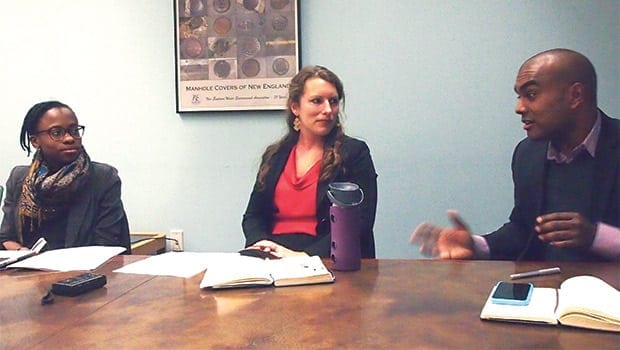
Easing height restrictions in exchange for the creation of affordable housing units, micro units in Roxbury and community land trusts are among the ideas being considered by the Mayor’s Housing Innovation Lab to lower the cost of home construction for middle income Boston residents.
While construction of high-rent luxury units has continued apace in Downtown Boston and in neighborhoods with high real estate values, the city’s inventory of moderately-affordable housing has not kept up with demand, adding pressure to Boston’s overheated real estate market.
Members of the Mayor’s Housing Innovation Lab want real estate developers to create prototypes of new models of housing construction and design to make housing more affordable for individuals and families earning between $50,000 and $125,000 a year.
For several months, lab members have been meeting with builders, neighborhood residents, city officials and other stakeholders to solicit ideas.
“A lot of ideas and solutions need to come together to make change,” said Marcy Ostberg, program co-manager for the Lab. “Boston is a very diverse city. We need to try a number of ideas across the city.”
The Mayor’s Housing Innovation Lab is a collaborative effort between the Department of Neighborhood Development and the Mayor’s Office of New Urban Mechanics. The project was funded by a grant from Bloomberg Philanthropies, one of 20 made to cities around the world to encourage innovation in designing and implementing new programs.
“Solving the middle income housing challenge is among the biggest challenges we face today,” Mayor Martin Wash said in a statement released to the media. “The Housing Innovation Lab is bringing a new way of thinking about these issues to the city, and I’m appreciative of the time and energy that they have put into this work.”
The team aims to test prototype projects in Roxbury and Jamaica Plain as soon as May of this year. As part of Plan: JP/Rox — a BRA-led planning process that includes Jackson Square, Egleston Square and Forest Hills — the team already has floated the idea of easing height restrictions to allow builders to add more units in exchange for the inclusion of a higher percentage of affordable units.
The team also is considering easing restrictions on allowable sizes of apartments, to allow so-called micro units in Boston neighborhoods. The current regulations call for a two-bedroom apartment to include 900 square feet of living space. Lab team members have not established a new threshold for the proposed micro units.
“We’re looking for architects and builders to pilot new ideas to make small units more affordable,” Ostberg said.
Land trusts
Community land trusts, where nonprofit entities develop permanently-affordable owner-occupied housing, are a third option the group is exploring. So far, Dudley Neighbors, Incorporated is the only land trust in Boston that has developed deed-restricted housing on a large scale. A challenge for future land trusts is that land acquisition costs are much higher than they were in the 1980s and ’90s when DNI acquired vacant parcels through eminent domain powers granted it by the city.
Other solutions under consideration include the idea of a first-time homebuyer portal — a website that would provide how-to information for prospective homebuyers in Boston, including a location guide to help people better understand the merits of the city’s diverse neighborhoods. While millennials have been moving to Boston in high numbers, attracted by the city’s growing tech sector, they have concentrated in a handful of downtown neighborhoods.
“We want to disperse growth throughout the city,” Ostberg said.
The group’s work comes as the city’s Metropolitan Building Trades Council has announced a new unit that will work for reduced wages on affordable housing projects in a bid to lower the average $400,000-per-unit cost of building new housing in Boston and its surrounding cities and towns.
“We need more housing in this region,” Brian Doherty, head of the Metropolitan Building Trades Council, told The Boston Globe. “There’s a big challenge in front of us and we want to be part of the solution.”
While construction wages generally make up the largest component of the cost of building in Boston, the cost of land comes second. While the city’s Department of Neighborhood Development will sometimes discount the sale of public land, the agency does not give land to to affordable housing developers for free, said spokeswoman Lisa Pollack.






